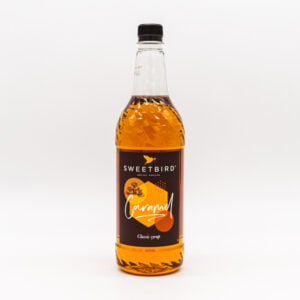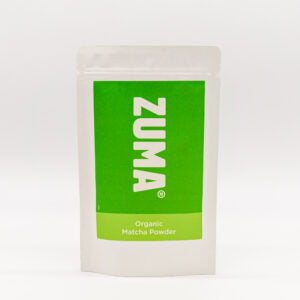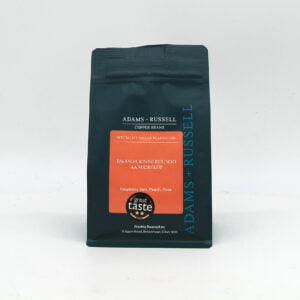A Vegan Perspective: The Best Milk Alternatives for Vegan Coffees
- Updated on: March 7, 2024
- Written by: Aimee Bennett
Aimee is a coffee enthusiast and has worked in the coffee industry for years. She sources coffee beans from around the world and her coffee journey began in… (read more).
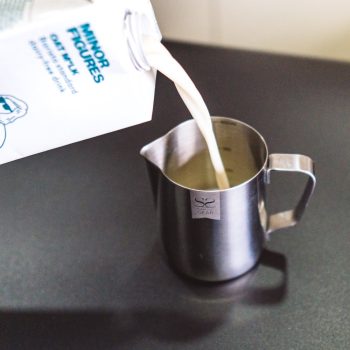
BY AIMEE BENNET – ADAMS + RUSSELL

The popularity of veganism over the past decade has increased drastically with a seven-fold increase in interest in just 2 years.
With many UK consumers more conscious of the health and environmental impact of eating animal products, a wide range of dairy free alternatives have entered the market.
This movement towards a more sustainable, healthier diet has resulted in large-scale change across the food and drink industry and a flux of plant-based drinks can now be found in delis, supermarkets, and coffee shops.
Over the last few years alternative milks have become increasingly convenient, their popularity reaching far beyond the vegan community or those with dietary restrictions.
In 2020 oat milk (the one that got everyone talking just a few years ago) became the alt-milk of choice, overtaking almond to become the biggest seller of that year. As 2021 draws to a close there’s an even more exciting — and somewhat overwhelming — set of choices with which to dilute your cold brew or compose your favourite coffee.
After being fringe choices at the start of the decade — soya, almond and oat have joined cow’s milk as menu staples, available in most coffee shops across the UK.
Then there’s the more curious contenders: pea, hemp, rice and cashew. Although highly lauded, they’re not typically available at your average high street café.
Still, there is some confusion around alternative milks. What do they taste like? Are they good for
me? How do I use them? Luckily the answers to these questions are uncomplicated. Most follow a
very basic recipe that you can even try at home, the premise of which involves soaking the base product for a period of time, blending the mixture until smooth and straining the solids. The results are a neutral tasting and surprisingly creamy textured milk that isn’t too dissimilar to cow’s milk.
Still, there is some confusion around alternative milks. What do they taste like? Are they good for me? How do I use them? Luckily the answers to these questions are uncomplicated.
Most follow a very basic recipe that you can even try at home, the premise of which involves soaking the base product for a period of time, blending the mixture until smooth and straining the solids.
The results are a neutral tasting and surprisingly creamy textured milk that isn’t too dissimilar to cow’s milk.
Below we explore plant-based milks, however there are other vegan alternatives to pair with coffee, such as syrups and hot chocolate. Find some of our vegan products available from Adams + Russell later in this post.
First, let’s see what this means for baristas.
What does this mean for baristas?
Plant milks are chemically different to cow’s milk. As a barista it’s important to develop an understanding of each milk in order to create high quality and consistent beverages.
Generally, the differences between regular and professional plant-based milks is in the fat and protein content as well as the addition of thickeners, emulsifiers and acidity regulators.
The latter prevents any curdling that may occur, since the pH of coffee is lower than that of the alternative milk, therefore preserving both the taste and visual appeal of the drink.
So, does using non-dairy milk risk overwhelming the nuanced flavours and aromatics of speciality coffee?
Not necessarily.
Whether you’re a consumer or a barista, it’s important to understand the differences between each product to help you create the best beverage you can.
We’ll summarise what they’re like to work with, how to pour the best latte art and most importantly— what they taste like with your coffee.
FYI
- All of the milks mentioned are ambient products, however when steaming we need as much time as possible to build the desired texture, so ideally they need to be kept refrigerated before use.
- As the temperature of non-dairy milks continues to rise after steaming, it’s best to stop them at 130°f -150°f to avoid overheating and broken texture.
- However if you’re in a customer service setting and a customer asks for ‘extra hot’ it’s best to fulfil their request. You just need to pay extra attention when steaming and incorporate a little less air than you usually would.
There are an array of health benefits from consuming plant-based milks
What plant-based milks are available and what are the benefits?
Vegan products aim to reduce the environmental and ethical impacts of meat and dairy industries.
By offering an alternative, greenhouse emissions are expected to fall, less animals will be exploited for dairy products and more land will be available for other resources.
There is also an array of health benefits from consuming plant-based milks as they contain less saturated fat, a higher protein content and many nutrients.
Here is a list of the main vegan milk options available:
Soya Milk Alternative for Coffee

Soy milk is probably the most popular vegan milk alternative, even before the Vegan boom of 2018.
This delicious alternative is made by adding water to ground soybeans, then filtering out the remaining beans after being heated.
Soybeans are also used to make tofu which is why soya milk has such a high protein content.
This also makes it relatively friendly to baristas, which is perhaps why it was the first plant-based milk to be seen in coffee shops.
Due to the high percent of protein, foam is able to be made easily and remains in the pitcher before pouring.
Soy also has a lighter taste, so it does not mask the flavour of the coffee, making it one of the best alternatives to add to your coffee.
- Thanks to its high protein content, soya aerates (stretches) easily and produces high quality, glossy microfoam.
- However, try not to incorporate too much air when you start steaming as it has a tendency to become too dry.
- Stable up to 65°C / 150°F
- Although a little challenging, latte art can be achieved. Keep it simple with a heart or tulip.
- Its taste is typically mild and once steamed has a creamy texture that is close to cow’s milk.
- It’s a very good source of protein, some brands fortify with different minerals and vitamins (D, B2 & B12)
Almond Milk Alternative for Coffee

Made by soaking sweet almonds in water, almond milk is a great vegan alternative for taste.
The nutty flavour of almond milk can complement some coffees very well and works great in hot chocolates and mochas.
Although low in protein, almond milk can steam very well if a little air is shaken into the carton before being dispensed into the pitcher.
Sweetened almond milk offers a richer taste for those wanting to indulge.
- Creamy and neutrally inoffensive. Possibly the closest to cow’s milk out of all those on the list.
- Aerates rapidly and doesn’t produce any large bubbles that rapidly sink.
- It’s easy to steam, almost the same reaction as cow’s milk. It textures consistently, making it easy to create high quality and more complex latte art.
- Oat has a rich and velvety taste that adds a slight sweetness to the espresso
- In terms of environmental impact, out of the four options mentioned it comes out on top. It requires the least amount of water and resource to produce.
Coconut Milk Alternative for Coffee

High in fat and electrolytes, coconut milk offers a rich flavour whilst being uber healthy.
As well as lowering cholesterol it can also improve digestion and alertness (which may not be necessary when added to coffee).
However, coconut milk can alter the taste of coffee and does not always cooperate with baristas. Some barista-edition coconut milks are available, which carry a thinner consistency making it easier to foam.
- Coconut has a naturally high fat content, it steams well however it’s easy to overfoam.
- This can create a mousse-like texture that is hard to remedy.
- Its strong, slightly bitter flavour can dominate the espresso. It is very much down to personal preference.
- However, this unique flavour can enhance non-espresso based drinks such as a chai or matcha latte and is incredible as an iced latte in the summer months.
Oat Milk Alternative for Coffee

Now the most popular plant-based alternative for coffees.
Oat milk has a delicious sweet and satisfying flavour and makes a lush combination with coffee.
The oats are soaked in water, blended, and then filtered. It is important to note that gluten free oats are used in oat milk production which makes it suitable for coeliacs (always check before you order).
Oat milk is difficult to foam, but with a little shake it can make a good head start – always allow the pitcher to settle for a few extra moments before pouring which should stabilise the milk.
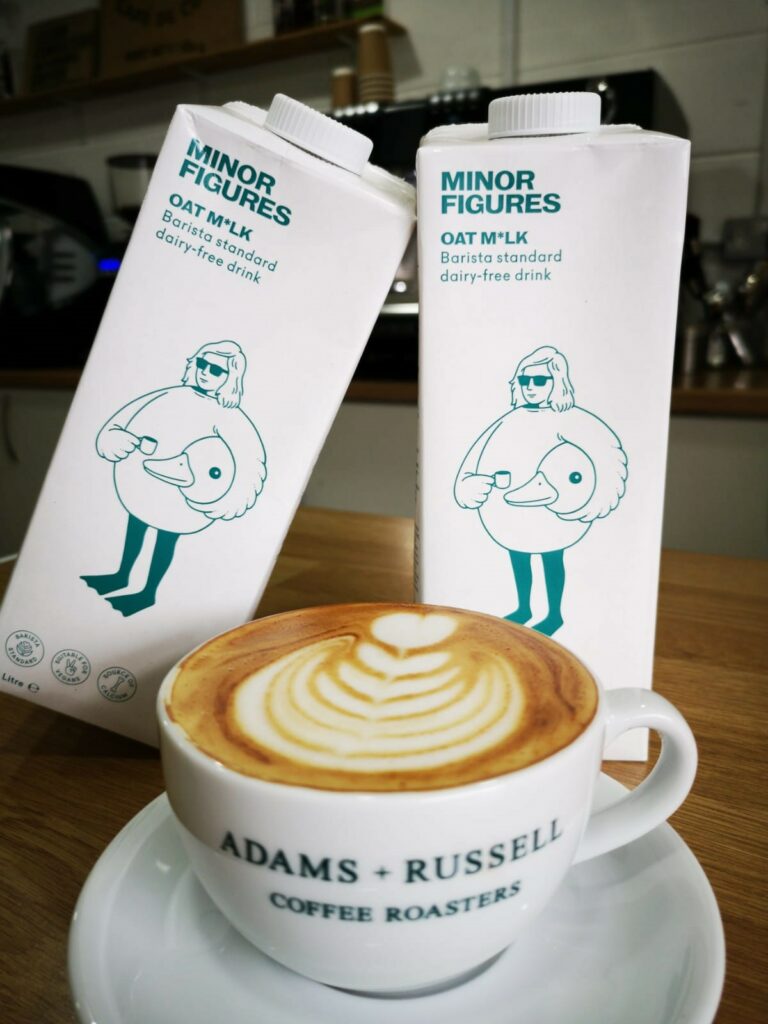
Personally speaking from a barista experience
From my (unashamedly biased) soya milk-loving perspective, plant milks are a pleasure to work with. Achieving the perfect latte art and texture may be a little more challenging, but with
practice and a basic understanding of each milk’s unique qualities, it is 100% possible to create a beverage that you’ll be proud to drink/serve.
Whether you’re a professional barista, an at-home enthusiast or just simply making yourself a quick brew there will be a professional non-dairy milk that fits your requirements and you’ll never have to put up with the frustration of split milk again.
Tips When Using Plant-Based Milks
Many baristas will be used to using dairy and will have to adapt their approach when using some plant-based milk.
Barista edition oat and soy milks often have added stabilisers that prevent it from splitting. Despite this, temperature difference can often still cause this splitting so adding a dash of cold oat/soy milk to the espresso helps incorporate the two together.
Controlling temperature is also important, soy milk which is too hot will denature the proteins and again cause splitting – which is a revolting texture.
To perfect your coffee making skills, have a read of our article on how to make coffee shop beverages at home.
Vegan Products Available at Adams + Russell
RELATED VEGAN PRODUCTS
-
- Out of Stock
Zuma Organic Matcha Powder 100g
- £8.50
- Read more
-
Whether you are fully vegan or just a conscious consumer of meat and dairy, be sure to know that you can enjoy a hazelnut cappuccino that contains zero animal products.
However, make sure you always ask if your choice of drink is vegan before ordering.
Some syrups contain dairy products and/or are made in factories containing dairy.
Further information about the products listed can be found by following the links.

